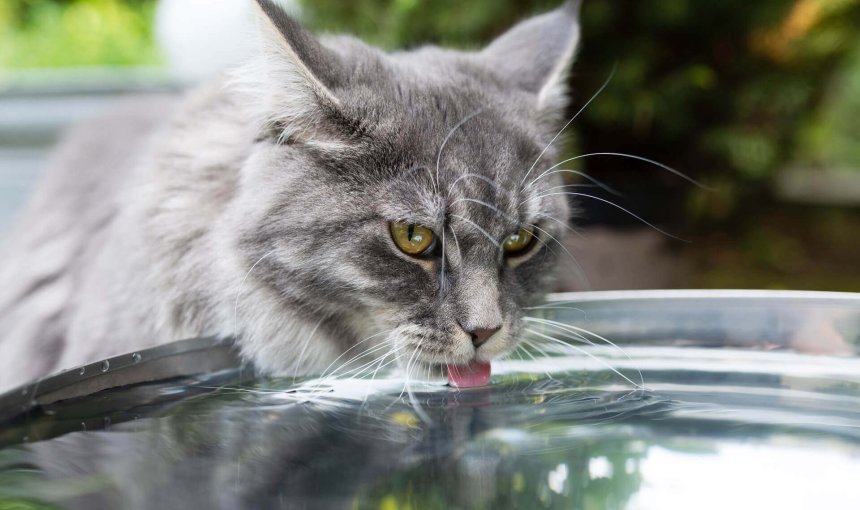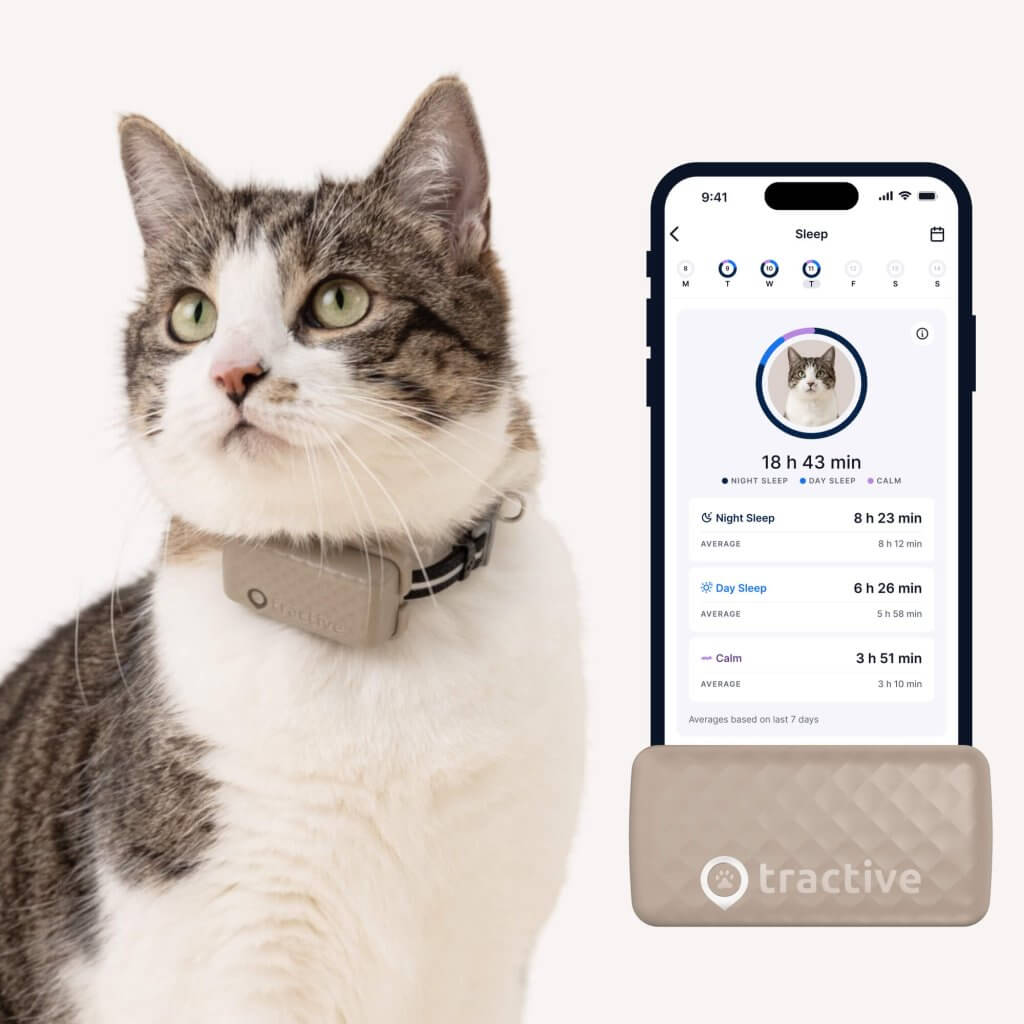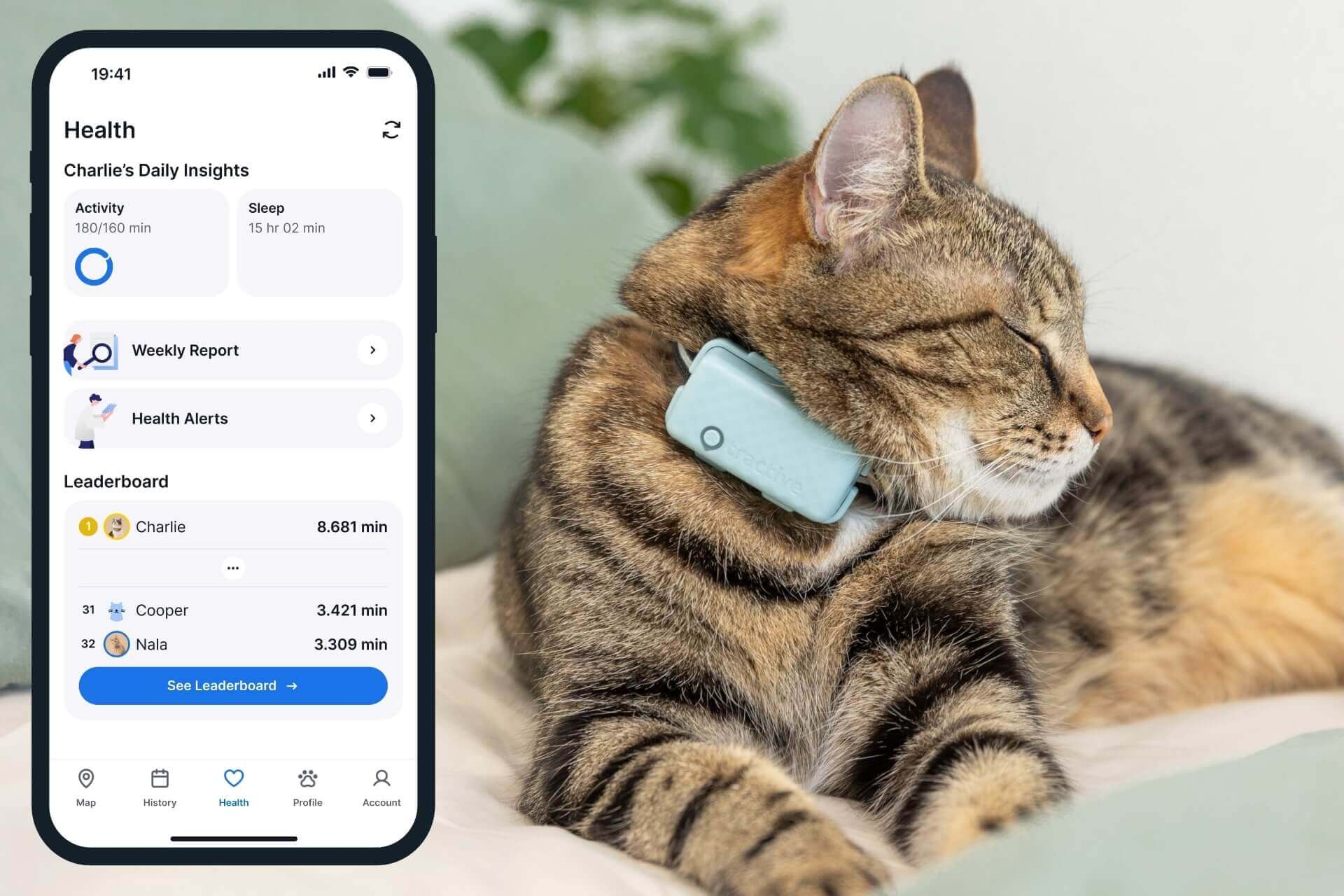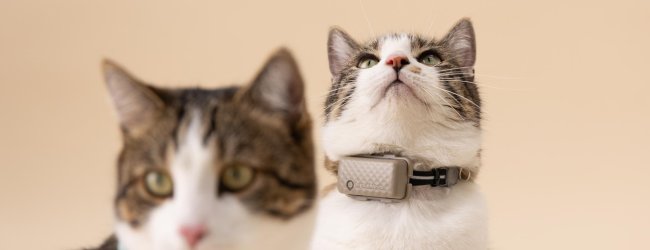 Approved by Dr. Dwight Alleyne, DVM
Approved by Dr. Dwight Alleyne, DVM Cat Drinking A Lot Of Water? Here’s Why.
Is your cat drinking too much water? Besides the more benign reasons like heat or exercise, excessive thirst in cats can be also be a sign of a medical issue. Here's what to do - and how to catch on to it early.

Your cat might not be the type to guzzle a ton of water (like your dog might). But just like us, they do need to drink water every day to stay healthy. So if you’ve noticed your cat drinking a lot of water out of nowhere…well, it’s understandable if you’re wondering why. Here are a couple of reasons why your cat may be drinking too much water – and how monitoring their everyday activity can help you catch on to health issues early.
Key Takeaways
Increased thirst can be a sign of a serious medical condition
While factors like heat and exercise can increase a cat’s water intake, excessive drinking can also be a symptom of conditions like diabetes, chronic kidney disease, or urinary tract diseases.
Monitor your cat’s behavior
Stay vigilant and watch for signs of increased drinking. These include frequent trips to the water bowl or drinking from unusual places. Other signs to look for include changes in appetite or activity level.
A vet visit is essential
If you notice your cat is drinking excessively, it’s important to consult a vet to get a proper diagnosis and treatment plan.
The Tractive smart cat collar can help.
A Tractive smart cat collar with Health Monitoring can help detect unusual changes in a cat’s activity, which could signal an underlying health issue. This can help you catch potential health problems early and get them checked up in time.

Find out where your cat spends their time.
Read moreHow much water should a cat drink?
As a rule of thumb: a cat weighing 10 pounds should drink between 7-9 ounces of water each day – so around one cup of water. Smaller cats consume less water, and larger cats drink a bit more.
If this sounds a bit…well, less, it’s just how your cat is built. Your cat’s wild ancestors originated from the desert. Aka, hot, dry climates where they mostly didn’t need a ton of water to get by. It’s why modern day cats have adapted to live on relatively small amounts of water. (So they don’t actually need to drink a ton of water per day to stay healthy.)
What else can influence how much water my cat drinks?
Your cat’s activity level, the type of food they eat, and the climate where you live can affect the amount of water that your cat drinks each day.
- A very active kitty that spends time outdoors patrolling their territory on a hot summer day might drink a bit more.
- A sedentary cat that relaxes all day in an air-conditioned home would drink less.
- Cats that eat dry food will usually drink more water than cats that eat wet canned food.
- Cats that eat wet food get a portion of their daily water needs from their food.
💡An smart cat collar with Health Monitoring can help you figure out just how active your cat is all day long – which we’ll cover in detail a little further below.

Help your cat stay fit and healthy
Get a complete overview of how much exercise and rest they’re getting. Compare their activity to that of similar cats. Set daily goals.
How to tell if your cat drinks a lot of water
Look out for these signs of increased water intake:
- Your cat visits the water bowl more often than they used to
- Your cat starts drinking from places they had not drank from before, like faucets, ponds, puddles, or the toilet. (Though if your cat has always had these drinking habits, there’s no need to worry).
- Your cat visits the litter box or urinates more frequently
Why is my cat drinking so much water? The less “scary” reasons
There are several possible reasons for a cat drinking a lot of water. Let’s start with a couple of the less concerning ones:
- In warm or hot weather, cats will often drink more water, especially if they spend time outdoors. During these times, make sure to watch out for the signs of heat stroke in cats.
- Increased physical activity can also spur your cat to drink more water. (Like if they’ve been expanding their outdoor territory or have befriended the squirrels in your backyard.)
- Some medications, such as diuretics which are prescribed to treat heart disease, can cause cats to drink more water than usual.
⚠️ If none of these scenarios describe your cat’s situation, you may have a more serious problem on your hands. Including underlying medical issues.
Medical issues that can cause a cat to drink a lot of water
Certain medical conditions can cause your cat to drink more water than they usually do. If you suspect that your cat has any of these conditions, visit your veterinarian as soon as possible.
- Diabetes mellitus, where your cat’s body struggles with high sugar levels – making them drink more water to dilute the sugars.
- Urinary tract diseases (UTIs) which tend to be caused by inflammation in the bladder, making your cat unable to pee and be in pain. So they might drink more water to help them pee.
- Chronic kidney disease, where your cat’s kidneys don’t remove toxins properly from their blood. With this toxin buildup, your cat might feel increasingly thirsty as their kidneys aren’t filtering out toxins like usual.
- Liver disease, which – like the kidneys – might not be “detoxing” your cat’s body properly.
How can I tell if my cat is actually sick?
Like most animals, cats are experts at hiding their illnesses. (It’s just how they’re built from an evolutionary perspective.) But with a little vigilance, you can catch on to a change in their behavior that might signal they’re struggling with a sickness, infection, or even pain. So pay close attention to any changes in your cat’s daily habits, including if they start drinking excessively. Some other signs you can watch out for include:
- Eating more or less than normal
- Behavior changes, including aggression
- Sleeping more than normal, or in unusual locations
- Diarrhea or other signs of illness
- A drop in your cat’s activity, or how much more (or less) on the move they are
If you see any of the above conditions or you’re concerned about your cat’s behavior, drop by your vet. They can help you rule out any underlying medical issues and advise you on the best way to care for your little buddy.
💡And if you’ve invested in an smart cat collar with Health Monitoring, you can spot the first signs of illness – much in advance.

With your trusty Tractive device strapped to your cat’s collar, its built-in motion detector picks up on your cat’s movements throughout the day. Which, with time, helps you figure out:
- How active your cat is on the regular,
- How active your cat is compared to other, similar cats in terms of age and breed
- If there’s an abnormal change in your cat’s activity – like a weird drop that might signal lethargy
So you can spot a change early, get your cat to a vet – and potentially save their life, while at it.
Your furry friend’s health and wellbeing means as much as to us as it does to you. So we’ve made it a priority to only share medically-relevant content on our blog. This post was checked, double-checked, and medically verified by Georgia-based vet, Dr. Dwight Alleyne.

Dr. Dwight Alleyne, DVM
Originally from Long Island, New York, Dr. Alleyne began his career at a no-kill animal shelter before becoming a licensed veterinary technician. He graduated from Cornell University Veterinary College in 2006 and completed an internship at Purdue University. Now practicing in Georgia, Dr. Alleyne specializes in soft tissue surgery and ultrasounds. He also writes pet health articles on his website, “The Animal Doctor Blog” (www.anmldrblog.com).



